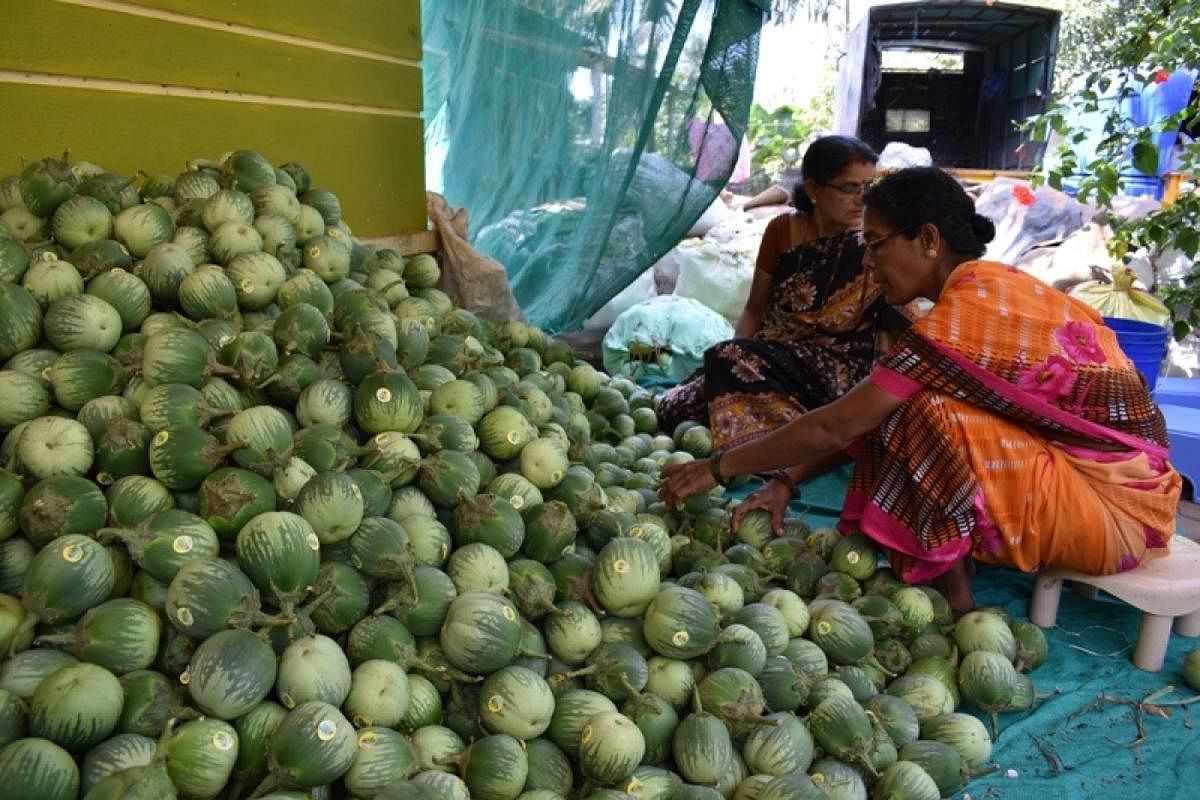
A three-year-long collaboration between growers and students from T A Pai Management Institute (TAPMI) and Welcomgroup Graduate School of Administration (WGSHA) in Manipal, on value additions of Mattu Gulla, is ready to bear fruit.
Udupi-based Farmer Producer Organisation (FPO), Mattu Raithara Souharda Sahakri (MRSS), launched to promote Mattu Gulla, a variety of Brinjal which adds an exceptional flavour to dishes, after securing GI (Geographical Indication) tag, patent and sticker (to set them apart from other brinjals), had teamed up with students, to make value additions to Mattu Gulla, to increase the income of farmers.
MRSS Chief Executive Officer (CEO) Lakshman told DH that only the perfectly rounded Mattu Gulla are labelled as first grade and sent to market.
Those with weird shapes, black spots and damage are categorised as discards and given to hotels or dumped in Goshalas (cowshed) and for compost making, he said.
A huge quantity of the annual yield of 1,200 to 2,000 tonnes of Mattu Gulla ends as discards, he added.
“TAPMI, in order to give back to the community, identified the value additions of Mattu Gulla, as one of the projects under SEVA (Society, Environment, Values and Attitudes). Students in batches work with farmers and tackle problems at the ground level while implementing United Nations Development Programme’s (UNDP) 17 Sustainable Development Goals (SDGs),“ says Prof Purnima Venkat, who is serving as an assistant professor and co-chair of TAPMI Centre for Inclusive Growth and Competitiveness.
“Continuing the good work of the previous batch, our team, with help from Prof Vasanth Kamath, Prof Valsaraj and WGSHA, developed value-added products, including sambhar powder, with dried pieces of Mattu Gulla, Dahi mix, chutney powder, spicy and sweet pickles,” said team members Aashish Padvetnaya and Riju Ghosh.
The 12-member team, all first-year MBA students, were divided into three teams to take the project to the next level, said Prof Purnima.
“The communication team, familiar with local languages, visited the site and were in contact with CEO Lakshman,” Aashish said.
“The financial team based on FPO’s data did analysis of pricing for each product and investment needed for setting up the factory. The event team has structured the programme to impart training and facilitate the transfer of knowledge to members of self-help groups,” said Riju.
Prof Purnima said the next batch of students will focus on branding and releasing products to market towards the end of this fiscal.
During the intervening period, TAPMI will continue to hand-hold by training members of SHGs, she added.
Riju said he was happy that four different SDGs were covered in one project.
Aashish said that the project was a good experience as they could implement what they had learnt in the classroom.
From Manipal to MIT
Value additions to Mattu Gulla were one among the three projects to receive cash rewards after being adjudged as the best (the other two being an in-campus project on relaunching a store on campus and another project on marketing SKDRDP’s Siri products in north Karnataka).
As part of the annual sustainability fair, Seva Jatre’, 500 students with 60 faculty mentors worked with about 30 clients on 42 projects. The three award-winning
projects will participate in the Massachusetts Institute of Technology (MIT) SOLVE Challenge in 2022.